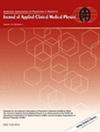American Association of Physicists in Medicine (AAPM) chapter climate check: Mixed methods analysis of survey responses
Abstract
Introduction
The American Association of Physicists in Medicine (AAPM) recently shared results and recommendations from its first Equity, Diversity, and Inclusion (EDI) Climate Survey, which was designed to assess the climate at the workplace, the AAPM organization, and the AAPM regional chapter level. This work further explores the status of EDI at the regional chapter level.
Methods
AAPM's EDI Survey was distributed to 5500 members and had a response rate of 25%. In the survey, three open-ended comment boxes were provided for feedback, including one for regional AAPM members. Sixty-four percent of respondents indicated they were part of a regional chapter, and 6% provided written responses to the regional chapter question. Responses were analyzed using a mixed methods approach with an exploratory sequential design. Two phases were conducted; the first relied on a Grounded Theory quantitative systemic approach, and the second applied qualitative analysis. Chapter member demographic data were collected to support findings.
Results
Survey respondents provided open comments and feedback on their regional chapter's climate. Data are summarized as five themes: positive experiences, negative experiences, challenges within chapters, diversity and inclusion, and changes observed. Experiences of regional chapters were rated positively by 75% of respondents. Respondents found their chapters were welcoming, and some noted their great chapter leadership. A number of incidents of sexual harassment, bullying, and discrimination incidences were also shared. Other respondents observed exclusion based on their gender, race, highest degree, and medical physics specialty. Chapter leadership data aligned with these claims, with most leaders to-date being white males, doctoral degree holders, and/or specializing in radiation therapy.
Conclusion
AAPM chapters provide rewarding professional opportunities. This study has highlighted positive and negative experiences reported by its members. The major themes identified can guide chapter leaders to continue to cultivate welcoming communities for regional AAPM members.


 求助内容:
求助内容: 应助结果提醒方式:
应助结果提醒方式:


